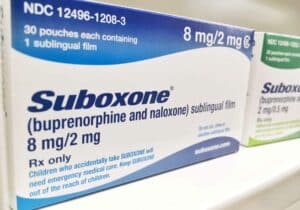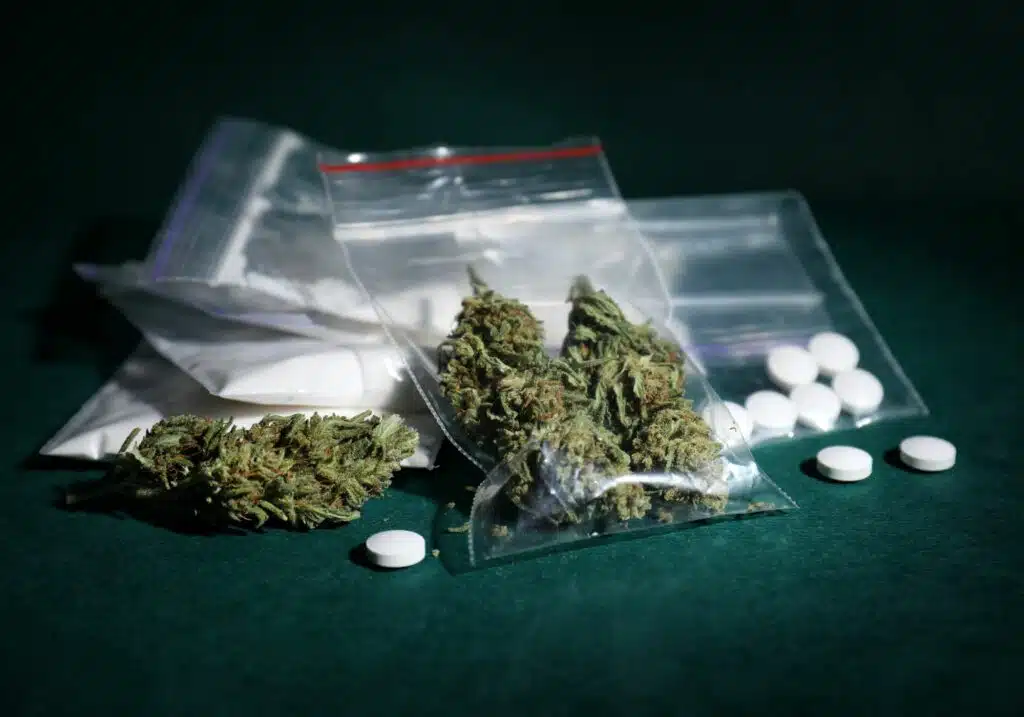While Adderall is prescribed for managing ADHD (Attention Deficit Hyperactivity Disorder), research indicates that 24% of students have used the medication. Beyond its academic application, Adderall is also utilized recreationally especially in teens, frequently in conjunction with weed to mitigate certain undesirable effects.
Combining Adderall and weed raises questions about the interactions within the body and the safety of such practices. This discussion aims to shed light on the implications of using these substances together. Should you find yourself in need of assistance, resources for treatment will also be provided. Let’s explore this topic further.
Side Effects of Adderall and Weed
To grasp the potential impacts of mixing weed and Adderall, it’s vital to first acknowledge their distinct side effects. This insight lays the groundwork for understanding their combined effects.
Adderall
Adderall, a central nervous system stimulant, is formulated from a blend of amphetamine salts, including dextroamphetamine saccharate, amphetamine aspartate, dextroamphetamine sulfate, and amphetamine sulfate. It boosts dopamine and norepinephrine levels in the brain, enhancing focus for those with ADHD. Beyond medical use, it’s also sought after for its stimulant properties to enhance productivity or induce euphoria. Common side effects include:
- Dry mouth
- Mood swings post-use
- Anxiety
- Sleep disturbances
- Headaches
- Weight changes
- Altered libido
- Gastrointestinal discomfort
Weed
Weed, a psychoactive substance typically smoked or ingested, contains THC (tetrahydrocannabinol) as its primary active ingredient, inducing a euphoric state. Despite its recreational appeal, cannabis can induce significant adverse effects, especially concerning potency and individual tolerance. These effects encompass:
- Paranoia
- Increased appetite
- Anxiety
- Mood alterations
- Blood pressure fluctuations
- Hallucinatory experiences
- Elevated heart rate
- Cognitive impairment
- Decreased motivation
Understanding the individual side effects of both Adderall and Weed is crucial for recognizing the potential interactions and risks when these substances are used concurrently.
What Is Weederall?
“Weederall” is the colloquial term for the recreational combination of cannabis (“weed”) and the prescription medication Adderall. Both substances are widely misused across the United States, each with distinct legal and health implications.
Weed, often referred to as marijuana, falls under the Schedule 1 controlled substances category, indicating a high abuse potential with no sanctioned medical application in a federal scope. Despite legalization in several states for medical or recreational use, it remains federally illegal.
Adderall, in contrast, is a legally prescribed stimulant designed to manage ADHD. Comprising a blend of dextroamphetamine and amphetamine salts, it’s known for enhancing focus and energy levels. Its misuse is notably prevalent among college students seeking to boost academic performance, dubbing it a “study drug.”
The allure of “weederall” lies in its purported ability to merge the heightened focus from Adderall with the relaxing euphoria of weed, creating a supposedly ideal state of creative mellowness yet alert. This blend has gained traction, particularly among students, for its unique effects.
However, the perceived harmlessness and potential benefits of this combination mask the real risks involved. The interaction between these drugs can lead to unforeseen and serious health concerns, challenging the myth of their mutual counterbalance.
What Happens When You Mix Adderall and Weed?
Combining Adderall, a stimulant medication, with weed, which possesses stimulant, depressant, and hallucinogenic properties, produces uncertain outcomes. This uncertainty stems from cannabis’s diverse effects on the brain and body, which can interact with Adderall in unpredictable ways.
Effects of Mixing Weed and Adderall
- Complex Interactions: Mixing weed and Adderall sends mixed signals to the body. This can result in erratic heart rates and disorientation in bodily functions.
- Potential for Negative Effects: The combination can spark a range of negative reactions such as dizziness, mood swings, and increased feelings of anxiety and paranoia, creating a tumultuous internal state.
- Cardiovascular Dangers: The concurrent elevation in heart rate and blood pressure heightens the risk of serious cardiovascular issues, including arrhythmias and the potential for heart failure.
- Cognitive Challenges: The clash between the stimulant and depressant effects can significantly impair cognitive abilities, transforming an attempt at focus into difficulty maintaining even basic conversations.
- Legal and Safety Issues: The impaired judgment resulting from this mix can lead to risky decisions, turning a casual night out into a situation with severe legal ramifications.
Why Do People Mix These Substances?
The rationale for mixing weed and Adderall frequently revolves around their opposing effects. Users seek to mitigate the adverse reactions associated with each substance when taken alone, hoping for a balance between the stimulant and depressant qualities. However, the interplay between a stimulant and a depressant can generate unforeseen consequences, potentially causing lasting harm.
The mixture predominantly appeals to young adults in academic or high-pressure work settings, searching for ways to manage stress or enhance focus. Additionally, individuals with a history of substance abuse, particularly concerning Adderall, are more inclined to experiment with this combination, seeking the unique effects it promises.
Is It Safe to Combine Adderall and Weed?
Mixing weed and Adderall raises significant safety concerns. While individual reactions vary, and research on their combined effects is limited, notable adverse outcomes have been observed. Both substances can induce an increase in heart rate, posing risks, especially for those with pre-existing heart conditions. Users have reported enhanced euphoria and reduced anxiety, attributing these effects to the sedative properties of cannabis, which may also counteract Adderall’s appetite suppression, potentially preventing weight loss. However, the mitigating effect of weed on Adderall’s side effects might encourage higher consumption, increasing the risk of dependency. This combination could escalate into an Adderall addiction if not monitored carefully, highlighting the dangers of mixing these drugs.
What Are the Dangers of Mixing Adderall and Weed?
Mixing Adderall and weed can lead to unpredictable and hazardous outcomes. This combination can intensify certain side effects, posing significant health risks.
Here are some dangers of mixing weed and Adderall:
Cardiac Concerns
One of the primary dangers of this mix is the heightened risk of cardiac issues, such as arrhythmias, blood pressure fluctuations, and potential heart attacks. Both Adderall and cannabis independently increase heart rate; their combined effect can place excessive strain on the heart, posing lethal risks, particularly for individuals with underlying cardiac conditions.
Mental Health Risks
The amalgamation of Adderall and cannabis escalates the likelihood of mental health complications. Anxiety, depression, paranoia, and even suicidal thoughts are among the adverse effects noted with their use. These risks are magnified when these substances are used together, potentially leading to severe mental health challenges and impaired cognitive functions, including memory, focus, and decision-making abilities.
Potential for Addiction
The danger of developing a substance use disorder is significantly increased when Adderall and weed are used concurrently. Both are inherently addictive; their simultaneous use amplifies dependency risks, compelling users to consume higher doses to achieve the desired effects, which can escalate to overdose.
Overdose Hazards
The combination of these substances elevates the overdose risk, as it can result in higher intoxication levels, making it challenging to gauge the quantity consumed. Particularly with potent forms of cannabis like dab weed, which boasts high THC concentrations, users may inadvertently increase their Adderall intake, elevating overdose risks.
The danger extends to the use of fake Adderall, especially among recreational users, which may contain hazardous substances, exacerbating health risks, and potentially leading to fatal outcomes.
Symptoms of an Adderall overdose include confusion, nausea, accelerated heartbeat, and seizures. Immediate medical intervention is crucial if these symptoms arise after mixing Adderall with cannabis.
Can You Get Addicted to Weederall?
Yes, weederall can lead to addiction due to the way mixing Adderall and weed combine and affect the brain’s reward pathways. Individually, both drugs have a high potential for dependency, with their combined use heightening the risk significantly. The potent high produced by weederall can be particularly challenging to resist for many individuals.
The simultaneous use of these drugs amplifies their addictive properties. If you notice a dependency on weederall for daily functioning, it’s crucial to consider professional assistance. Addiction to weederall is a serious concern that requires support and intervention for recovery.
Signs of Adderall and Weed Addiction
Recognizing addiction to Adderall and weed involves observing changes in usage patterns and behavior:
- Withdrawal symptoms emerge when reducing or ceasing use, indicating a physical dependence.
- A progressive need for larger amounts to reach the same level of high suggests tolerance and addiction.
- Withdrawal from previously enjoyable activities is a classic sign of addiction’s impact on one’s life.
- Excessive time spent obtaining these substances points towards a deepening dependency.
Understanding these risks and symptoms is crucial for anyone grappling with or witnessing substance use issues, emphasizing the importance of seeking professional help for recovery and rehabilitation.
Addiction Treatment in Chattanooga, TN
Understanding the risks of mixing weed and Adderall is crucial for recognizing the need for help with addiction. If you’re grappling with substance use, choosing the right drug rehab in Chattanooga, TN is essential but can be challenging. Many treatment options focus solely on detox, which, while important for immediate recovery, may not address the root causes or support long-term sobriety.
Iris Wellness Group offers a comprehensive approach to addiction treatment in Chattanooga, Tennessee. We specialize in outpatient medically-supervised detox and provide ongoing outpatient treatment for both teenagers and adults dealing with substance addiction and mental health issues. Recognizing that every individual’s journey to recovery is distinct, our programs are customized to meet the unique needs of each person.
If you’re prepared to take the first step towards recovery, Iris Wellness Group is here to guide you on your path to a healthier, substance-free life. Contact us today at 423-460-9766 or fill out our online form to learn more about how we can support your journey to recovery.










